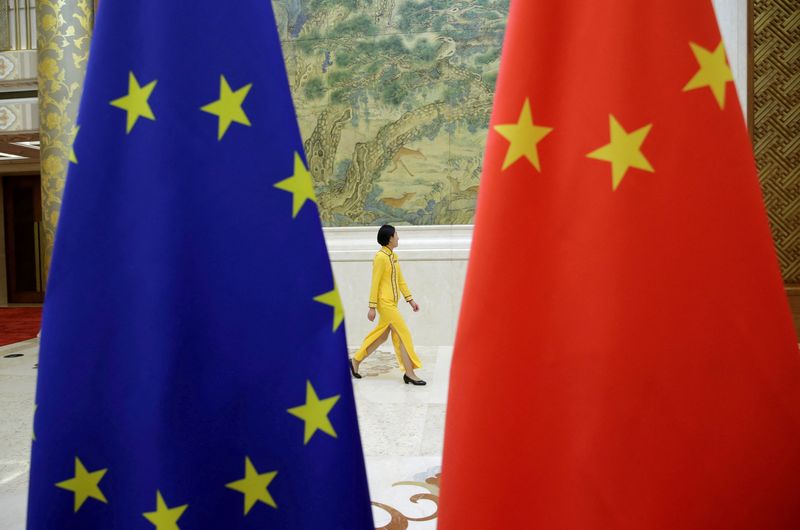SHANGHAI/BEIJING/BERLIN (Reuters) -Chinese automakers have urged Beijing to hike tariffs on imported European gasoline-powered cars in retaliation for Brussels' curbs on exports of Chinese-made EVs, the state-backed Global Times newspaper said on Wednesday.
In a closed-door meeting on Tuesday also attended by European car companies, China's auto industry "called on the government to adopt firm countermeasures (and) suggested that positive consideration be given to raising the provisional tariff on gasoline cars with large-displacement engines," according to the report.
The meeting, organised by China's Ministry of Commerce, was held in Beijing and attended by SAIC, BYD (SZ:002594) , BMW (ETR:BMWG), Volkswagen (ETR:VOWG_p) and its Porsche division, two people with direct knowledge of the matter said.
The main aim of the meeting was to put pressure on Europe and lobby against the tariffs Brussels announced last week to shield its car industry from Chinese competition, they added.
The meeting was also attended by Mercedes-Benz (OTC:MBGAF), Stellantis (NYSE:STLA) and Renault (EPA:RENA), two separate sources familiar with the matter told Reuters.
The ministry did not immediately respond to a faxed request for comment.
BMW, Volkswagen, Stellantis and Renault declined to comment.
A spokesperson for Mercedes-Benz said the group supports a liberal trade regime based on WTO rules.
"Against the background of globalisation and the economic interdependencies of our time, the motto for securing prosperity and peace is: dialogue and constructive cooperation. We are counting on the efforts of politicians to continue this dialogue."
Industry insiders say both Europe and China have reasons for wanting to strike a deal in the months ahead to de-escalate tensions and avoid the addition of billions of dollars in new costs for Chinese EV makers, as the EU process allows for review.
'TARIFF WAR'
The announcement to impose tariffs could trigger talks between Brussels and Beijing that are aimed at avoiding them, said Stefan Hartung, CEO of Bosch, the world's largest automotive supplier.
The European Commission said on Wednesday it was looking into the situation "with a view to discussing if a mutually agreeable solution can be found."
EU trade policy is turning increasingly protective amid concerns that China's production-focused, debt-driven development model could see the 27-member bloc flooded with cheap goods, including electric vehicles, as Chinese firms look to boost sales overseas due to weak demand at home.
The European Commission's June 12 announcement that it would impose anti-subsidy duties of up to 38.1% on imported Chinese EVs from July followed a move by the United States to hike tariffs on Chinese cars in May, and opens a new front in the West's trade war with Beijing.
"Personally, I think it is unfair to start a tariff war solely on the basis of (China's) capacity utilisation rate and insufficient demand for China's new energy vehicles," said Zhang Yansheng, chief research fellow, China Center for International Economic Exchanges.
"We can see that China has adopted a package of policies to solve the 'overcapacity' problem, so this year, next year, and into the next four years, China's capacity utilisation will continue to rise," he added.
The Global Times first reported late last month that a Chinese government-affiliated auto research centre was suggesting China raise its import tariffs on imported gasoline sedans and sport utility vehicles with engines larger than 2.5 litres to 25%, from the current rate of 15%.
Chinese authorities have previously hinted at possible retaliatory measures through state media commentaries and interviews with industry figures.
HOSTILE HINTS
The same newspaper last month also hinted that Chinese companies planned to ask authorities to open an anti-dumping investigation into European pork products, which China's commerce ministry on Monday announced it would undertake.
It has also urged Beijing to look into EU dairy imports.
Exports of passenger vehicles with engines bigger than 2.5 liters from Europe to China totalled 196,000 units in 2023, up 11% year-on-year, according to data from China Passenger Car Association. In the first four months of 2024, exports of such vehicles from Europe to China stood at 44,000 units, down 12% from the same period a year ago.
EU car exports to China were worth 19.4 billion euros ($20.8 billion) in 2023, while the bloc bought 9.7 billion euros of electric vehicles from China, according to EU statistics agency figures.
China accounts for about 30% of German carmakers' sales, and Germany is by far the largest exporter of vehicles with engines of 2.5 litres or above, having shipped $1.2 billion worth to China since the beginning of this year, Chinese customs data shows.
Mercedes Benz (ETR:MBGn)'s big-sized GLE Class SUV, S Class sedans and Porsche's Cayenne are the three most popular imported cars from Europe in China, the three of which accounted for more than one-fifth of the total 155,841 imported cars of European brands in the first five months, according to data tracked by China Merchants Bank International.
Slovakia is China's fourth-largest and the EU's second-biggest provider of cars with large engines. This year it has exported $803 million worth of sport utility vehicles.

The United States, the United Kingdom and Japan all also export large numbers of cars with engines bigger than 2.5 liters, and would presumably stand to benefit most from the proposed tariff increase.
($1 = 0.9314 euros)